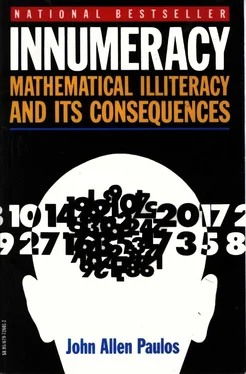So far, so good. But what about the following? Again, you're a general faced with a decision between two escape routes. If you take the first one, you're told, 400 of your soldiers will die. If you choose the second route, the probability is 1/ 3that none of your soldiers will die, and 2/ 3that all 600 will die. Which route do you take?
Most people (four out of five) faced with this choice opt for the second route, reasoning that the first route will lead to 400 deaths, while there's at least a probability of 1/ 3that everyone will get out okay if they go for the second route.
The two questions are identical, of course, and the differing responses are a function of how the question is framed, whether in terms of lives saved or of lives lost.
Another example from Tversky and Kahneman: Choose between a sure $30,000 or an 80 percent chance of winning $40,000 and a 20 percent chance of winning nothing. Most people will take the $30,000 even though the average expected gain in the latter choice is $32,000 (40,000 x.8). What if the choices are either a sure loss of $30,000 or an 80 percent chance of losing $40,000 and a 20 percent chance of losing nothing? Here most people will take the chance of losing $40,000 in order to have a chance of avoiding any loss, even though the average expected loss in the latter choice is $32,000 (40,000 x.8). Tversky and Kahneman conclude that people tend to avoid risk when seeking gains, but choose risk to avoid losses.
Of course, we needn't resort to such clever examples to realize that how a question or statement is framed plays a big role in how someone responds to it. If you asked an average taxpayer how he feels about a 6 percent utility increase, he'd probably be amenable. If you asked his reaction to a $91 million hike in utility bills, he probably wouldn't be. Saying that someone scored in the middle third of his class is more impressive than saying that he scored in the 37th percentile (better than 37 percent of his peers).
A more common source of innumeracy than psychological illusions is what Sheila Tobias calls math anxiety. In Overcoming Math Anxiety she describes the block many people (especially women) have to any kind of mathematics, even arithmetic. The same people who can understand the subtlest emotional nuances in conversation, the most convoluted plots in literature, and the most intricate aspects of a legal case can't seem to grasp the most basic elements of a mathematical demonstration.
They seem to have no mathematical frame of reference and no basic understandings on which to build. They're afraid. They've been intimidated by officious and sometimes sexist teachers and others who may themselves suffer from math anxiety. The infamous word problems terrify them, and they're convinced that they're dumb. They feel that there are mathematical minds and nonmathematical minds, and that the former always come up with answers instantaneously whereas the latter are helpless and hopeless.
Not surprisingly, these feelings constitute a formidable block to numeracy. There are things to be done for those who suffer from them, however. One simple technique which works surprisingly well is to explain the problem clearly to someone else; if a person can sit still for this, he or she may think about the problem long enough to realize that additional thought might bring results. Other techniques may be: to use smaller numbers; to examine related but easier problems or sometimes related but more general problems; to collect information relevant to the problem; to work backwards from the solution; to draw pictures and diagrams; to compare the problem or parts of it to problems you do understand; and most important of all, to study as many different problems and examples as possible. The truism that one learns how to read by reading and how to write by writing extends to solving mathematical problems (and even to constructing mathematical proofs).
In writing this book, I've come to understand a way in which I (and probably mathematicians in general) contribute unintentionally to innumeracy. I have a difficult time writing at extended length about anything. Either my mathematical training or my natural temperament causes me to distill the crucial points and not to dwell (I want to write "dither") over side issues or contexts or biographical detail. The result, I think, is clean exposition, which can nevertheless be intimidating to people who expect a more leisurely approach. The solution is for a variety of people to write about mathematics. As has been said about many subjects, mathematics is too important to be left to the mathematicians.
Different from and much harder to deal with than math anxiety is the extreme intellectual lethargy which affects a small but growing number of students, who seem to be so lacking in mental discipline or motivation that nothing can get through to them. Obsessive-compulsive sorts can be loosened up and people suffering from math anxiety can be taught ways to allay their fears, but what about students who don't care enough to focus any of their energy on intellectual matters? You remonstrate: "The answer's not X but Y. You forgot to take account of this or that." And the response is a blank stare or a flat "Oh, yeah." Their problems are an order of magnitude more serious than math anxiety.
Romantic misconceptions about the nature of mathematics lead to an intellectual environment hospitable to and even encouraging of poor mathematical education and psychological distaste for the subject and lie at the base of much innumeracy. Rousseau's disparagement of the English as "a nation of shopkeepers" persists as a belief that a concern with numbers and details numbs one to the big questions, to the grandeur of nature. Mathematics is often taken to be mechanical, the work of low-level technicians who will report to the rest of us anything we absolutely must know. Alternatively, mathematics is sometimes endowed with a coercive character which is somehow capable of determining our future. Attitudes such as these certainly predispose one to innumeracy. Let's examine some of them.
Mathematics is thought to be cold, since it deals with abstraction and not with flesh and blood. In a sense, of course, this is true. Even Bertrand Russell termed the beauty of pure mathematics "cold and austere," and it is precisely this cold and austere beauty that initially attracts mathematicians to the subject, since most are essentially Platonists and conceive of mathematical objects as existing in some abstract, ideal realm.
Still, pure mathematics is only part of the story; almost equally important is the interplay between these ideal Platonic forms (or whatever they are) and their possible interpretation in the real world, and in this extended sense mathematics is not cold. Recall that mathematics as simple as "1 + 1 = 2" can still be thoughtlessly misapplied: If 1 cup of popcorn is added to 1 cup of water, we do not end up with 2 cups of soggy popcorn. In trivial cases as well as in difficult ones, mathematical applications can be a tricky affair, requiring as much human warmth and nuance as any other endeavor.
Even when mathematics is at its purest and coldest, its pursuit is often quite hot. Like any other scientists, mathematicians are motivated by a complex of emotions including healthy doses of jealousy, arrogance, and competitiveness. Research mathematicians attack their problems with an intensity and compulsiveness which seem related to the purity of their research. A strong streak of romanticism runs through mathematics, manifesting itself most clearly in the most fundamental areas of mathematics, number theory and logic. This romanticism extends at least as far back as the mystical Pythagoras, who believed that the secret of understanding the world lay in understanding number; it found expression in the numerology and Cabala of the Middle Ages, and persists (in a nonsuperstitious form) in the Platonism of the modern logician Kurt Gödel and others. The existence of this romantic tendency constitutes at least a small part of the emotional makeup of most mathematicians, and is perhaps surprising to those who think of mathematicians as cold rationalists.
Читать дальше












